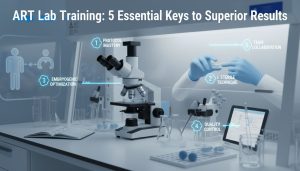What is IUI?
IUI or Intrauterine insemination is a process in which the washed sperm sample is deposited into the uterus. A small catheter (tube-like small object) is used for this.
It is a very simple procedure. Unlike a hospital procedure, it can be performed in clinics or home relatively easily.
What does sperm washing mean?
Sperm preparation is another term for washing. It is a laboratory technique for separating sperm cells from other cells and fluid, and the separating motile sperm from non-motile sperm, to use in IUI or IVF.
The technique maximizes healthy sperms. A syringe is loaded with this sample for injection.
Is IUI Painful?
An Intrauterine Insemination feels very much the same as a PAP smear test during a health check which is a very routine test. The process is not painful at all.
The discomfort experienced is generally due to the ovulation process and feels more like cramps or slight pain in the lower abdomen.
Precautions after IUI?
Generally, we recommend you lie down to reduce any feeling of discomfort.
In addition, you should not engage in any major activity like lifting weights or activities that involve a lot of physical exertion.
How does IUI work?
Before Intrauterine Insemination, ovulation stimulating medications may be used.
Therefore, the cycle needs to be closely monitored. The IUI procedure takes place around the time of ovulation.
This is 1-2 days post surge of the Luteinizing Hormone (LH). This indicates that ovulation is about to occur.
Are there any devices that are available to help to monitor ovulation?
There are multiple tests and devices available viz. urine tests for hormone levels, fertility monitors, thermometers for basal temperature, etc. We will guide you on the appropriate use of these tests and monitors as per your needs.
What Happens Post Procedure?
After the procedure, certain medications may be prescribed. These are taken orally or via a suppository.
About a week post the procedure, the doctor might prescribe lab tests to check your hormone levels (progesterone, estrogen, hCG)
After a couple of weeks post-Intrauterine Insemination, the doctor may advise you to perform a urine pregnancy test or prescribe a blood test to check for pregnancy.
Risks of IUI
There is a small chance of infection post the procedure.
In case the gonadotrophin levels are high, there are chances of conceiving multiples (twins, triplets)
Success of IUI
The success rate of IUI is similar to the pregnancy rate of fertile couples achieving conception on their own.
The chances of getting pregnant are 10%-20% with a single cycle but can increase to as high as 80% with 3 to 6 cycles.
However, the success rate depends on several factors like the age of woman, the semen sample of man and medical condition.
The data suggests that the success rate decreases with age and the chances of success for a woman >40 years of age have less than 8% and therefore, IUI is not recommended in women above 40 years of age.
The success rate of IUI is highest for infertility with unexplained reason and with problems in ovulation.







